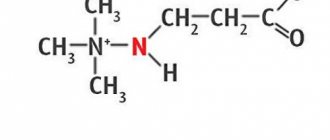Magnesium[edit | edit code]
Magnesium
is a mineral macroelement that is involved in bone formation, regulation of nervous tissue, carbohydrate metabolism and energy metabolism. Magnesium improves blood supply to the heart muscle, so it is necessary for older people. In some important processes, magnesium acts as a calcium antagonist; excess magnesium reduces calcium absorption. The optimal ratio of calcium and magnesium is 10:7, this ratio is supported by a common set of foods. With a lack of magnesium, irritability increases.
Taking a magnesium supplement (300 mg/day) lowers blood pressure by an average of 12 mmHg. Art.
The main functions of magnesium (Vertkin A.L. et al., 1997)
- Increasing the energy potential of the cell
- Strengthening metabolic processes
- Antagonism with calcium
- Formation of complexes with ATP molecules and activation of more than 300 enzymes, including all ATPases (Mg-dependence)
- Participation in protein synthesis
- Promoting muscle fiber relaxation
- Counteracting the uncoupling of oxidation from phosphorylation
- Participation in the synthesis of fatty acids and lipids
- Inhibition of acetylcholine release from the presynaptic terminal
- Regulation of glycolysis
- Participation in the synthesis and breakdown of nucleic acids
- Binding of norepinephrine in granules (inactivation and reserve)
- Energy exchange
- Plastic exchange
- Electrolyte metabolism
- Decrease in the level of Na+ and Ca2+ in the cell Increase in the level of K+ in the cell → Polarization of the cell membrane
How to take magnesium
You need to start taking magnesium gradually.
Increase dosage until magnesium begins to have an effect on stool. If this happens, the required dosage is the one that was on the day before the last dose.
To reduce the effect on the digestive system, the daily portion can be divided into several doses
Should I take magnesium in the morning or evening? With food or on an empty stomach?
Magnesium intake may vary depending on the dosage, indications for use and tolerability of the specific form.
General recommendations for taking magnesium include advice: divide the intake into two servings. Take one serving in the morning, after breakfast. Take evening magnesium intake after dinner.
In most cases, taking magnesium at the same time every day is sufficient.
If you miss a dose during the day, take magnesium as soon as you remember. You should not take a double dose of magnesium if you remember the missed dose the next day.
For more detailed information about your magnesium supplement regimen, please read the instructions or visit the supplement page on iHerb
Magnesium in bodybuilding[edit | edit code]
Magnesium has an important place in bodybuilding not only because it is supported by theoretical evidence, but recent studies have shown that supplementation with magnesium can improve training performance. The role of magnesium in bodybuilding is that it takes part in energy production and protein synthesis. In addition, large losses of magnesium occur with sweat. In this regard, athletes often cannot fully meet the body's magnesium needs from food sources.
Brilla and Haley of Western Washington University in Bellingham published a study where athletes took magnesium supplements during bodybuilding exercises. The findings showed that the athletes were able to increase their results in strength and weight gain. Although the significant effect on strength indicators is well proven, the effect of magnesium on muscle growth and testosterone increase remains questionable (in the absence of a dietary deficiency)
.
Given the above facts, magnesium is often included in sports nutrition, including ZMA.
Recommended doses for bodybuilding[edit | edit code]
The recommended daily dose of magnesium for men aged 19-30 years is 200-400 mg, and for men over 30 years old - 420 mg per day. The recommended dose for women aged 19-30 years is 310 mg, and for women over 30 years old - 320 mg.
Loading and reception mode for increasing strength[edit | edit code]
The Effect of Magnesium Citrate on Muscle Strength
Although several studies[1][2][3][4] have previously established the positive effects of magnesium supplementation in sports to improve strength performance, the optimal dosage regimen remains questionable. In a study by Lindsy S Kass[5], subjects took magnesium using two protocols:
- Group 1 took magnesium citrate orally at a dose of 300 mg/day for 1 week, 3 hours before training, or at any other time on non-training days.
- Group 2 took magnesium citrate in the same quantities, but for 4 weeks.
After 1 and 4 weeks, respectively, the subjects were tested, which consisted of a bicycle ride (40 km) and after 30 minutes performing a bench press to failure (80% 1RM). The same tests were repeated the next day.
Conclusions:
Magnesium increased strength performance by 17% on the day of testing in the group that took it for 1 week.
On the second day of testing, strength indicators also remained elevated. The group that took magnesium for 4 weeks did not show statistically significant changes in strength indicators. Thus, the authors believe that taking magnesium gives the maximum effect in increasing strength only in the first few days of use
, then this effect disappears.
Recommended dosages of magnesium
Reception is recommended in courses of 3-4 months - since the accumulation (accumulation in tissues) of magnesium leads to a decrease in heart rate.
- For a young person aged 20 to 30 years, the recommended dosage of pure* magnesium would be around 400 mg
- For a man over 35 years old – the recommended dosage is magnesium 450 pure* mg
- For girls 20-30 years old - the recommended dosage will be approximately 300 mg of pure* magnesium
- For older representatives of the fair sex, the dosage is higher - 350 mg of pure* magnesium
Now let’s pay attention to what pure magnesium is. That is, the drugs that are sold in pharmacies contain mainly not pure magnesium, but its salts, for example, magnesium citrate or magnesium lactate. In terms of pure magnesium, about 500 mg of magnesium lactate contains about 50 mg of pure magnesium. What follows is simple math. For example, if you are a 25-year-old young man involved in bodybuilding or powerlifting, and your heart is under enormous stress, your average dosage is 8 tablets of Magnelis B6 or magnesium lactate.
Always read the instructions carefully and check the pure magnesium content.
The dosage is selected from least to highest. The first two or three days we take 150-200 mg of pure magnesium, see if there are any side effects in the form of nausea and diarrhea, and then, if everything is fine, then every day we increase the dosage by 50 mg and thus reach the recommended one.
Magnesium in sports[edit | edit code]
Magnesium, a mineral responsible for more than 400 metabolic reactions in the body, is touted as the best support for your exercise. One study linked magnesium intake to muscle strength. The experimental group of men were given 500 mg of magnesium daily - more than the recommended daily dose of 400 mg. The control group took 250 mg per day - significantly less than the daily dose. Both groups trained with weights for eight weeks and then had their leg strength measured. The men who took the supplement became stronger, while the control group remained the same. But most researchers are still not sure that magnesium helps increase strength. They emphasize that the level of magnesium in the athletes' bodies was not determined before the start of the study. This is an important point because supplementing with any nutrient that your body is deficient in will most often have a positive effect on health and athletic performance. Overall, experts have now concluded that magnesium supplementation has no effect on aerobic or muscle strength.
Combination[edit | edit code]
Magnesium supplements are often combined with calcium to improve nervous system and muscle function, including heart rate regulation.
How to avoid magnesium deficiency?
Through proper nutrition, you can prevent magnesium deficiency in the body. Research has shown that 26 percent of men and 29 percent of women do not get the required amount of magnesium (300-400 mg) from food. The reasons for this state of affairs are a poor diet not rich in magnesium, alcohol abuse, diseases of the gastrointestinal tract, and taking medications that remove magnesium from the body (diuretics, for example). The level of magnesium in the body decreases with age, when under stress and in people who play sports professionally. In addition, a large amount of magnesium is lost if a person suffers from diabetes or kidney disease, so it is necessary to try to replenish the reserves of this mineral by consuming foods that contain it. In order for the body to absorb the maximum amount of magnesium, you should avoid consuming substances that interfere with its absorption.
So, to ensure that you get enough magnesium into your body, you should:
- Eat a balanced diet;
- Consume plenty of green vegetables, since magnesium is the main component of the plant pigment chlorophyll;
- Consume flounder, sole, chicken, corn, amaranth, sunflower seeds, soy flakes or whole grain bread;
- After a strenuous workout or competition, increase the amount of magnesium-containing foods in your diet;
- Pay attention to the factors that affect the level of magnesium in the body;
- When purchasing mineral water, make sure that the level of magnesium in it is not lower than 100 g/l;
- In case of replacement therapy, divide the daily dose between two main meals;
- Consume magnesium in combination with other elements, which will ensure its better absorption (magnesium citrate or magnesium aspartate).
Magnesium in food[edit | edit code]
Foods rich in magnesium
Almost half of the daily requirement of magnesium is provided by cereals and cereal products. There is a lot of magnesium in legumes, nuts, leafy vegetables, blackberries, raspberries, and strawberries.
Magnesium content in some foods
| Product | Magnesium content , mg/100 g of product |
| Beans | 167 |
| Oatmeal | 133 |
| Buckwheat | 113 |
| Peas | 107 |
| Millet | 87 |
| Rye bread | 73 |
| Rice | 37 |
| Wheat flour bread | 31 |
| Beet | 22 |
| Potato | 17 |
| Carrot | 17 |
| Beef | 16 |
| Mutton | 15 |
| Whole milk | 14 |
| Egg (yolk) | 12 |
| Egg (white) | 12 |
| Onion | 12 |
| Cabbage | 12 |
The ratio of calcium and magnesium in some foods
| Product | Ca:Mg ratio |
| Beans | 1:1 |
| Oatmeal | 1:1,8 |
| Buckwheat | 1:2 |
| Peas | 1:1,7 |
| Millet | 1:2,6 |
| Rye bread | 1:2,5 |
| Rice | 1:1,3 |
| Wheat flour bread | 1:1,6 |
| Beet | 1:1 |
| Potato | 1:2 |
| Carrot | 1:0,5 |
| Beef | 1:5 |
| Mutton | 1:2 |
| Whole milk | 1:0,1 |
| Egg (yolk) | 1:0,1 |
| Egg (white) | 1:2 |
| Onion | 1:0,4 |
| Cabbage | 1:0,4 |
Magnesium and sports
Home ▸ Articles ▸ Sports supplements ▸ Vitamins and minerals ▸ Magnesium and sports
Physicians call magnesium (Mg) the main metal of life. In stressful situations in which an athlete finds himself during long and intense training, at important competitions, an acute deficiency of magnesium occurs. The higher the responsibility, the more often this deficiency occurs, the more deeply it affects the body. A person gets maximum magnesium from food and drink, especially from hard, acidic water. Magnesium enters the body with food. It is rich in baked goods made from wholemeal flour, cereals, legumes (peas, beans), nuts, vegetables, cauliflower, apricots. Dairy products contain relatively little magnesium, but they contain it in an easily digestible form in the form of magnesium citrate. The champions in the content of this metal are fish (especially salmon), tahini halva, soy, chocolate, fresh fruit (especially bananas), herbs, and watermelons. The daily requirement is 0.3 g. Magnesium is necessary for the metabolism of calcium and vitamin C, as well as phosphorus, sodium and potassium. Important for the efficient functioning of nerves and muscles, as well as for the conversion of blood sugar into energy. Known as an anti-stress substance, necessary for the formation of bones and teeth. Works better together with vitamin A, calcium and phosphorus. Plays an important role in the regulation of neuromuscular activity of the heart, strengthens normal heart rhythm, is necessary for the metabolism of calcium and vitamin C, and is involved in the conversion of carbohydrates into energy. In total, the body contains about 20 g of Mg, mainly in the bones and inside cells. Magnesium reduces the excitability of neurons and the transmission of nerve impulses, and participates as a cofactor in many enzymatic reactions. By replenishing the relative deficiency of dopamine, it alleviates symptoms of nervous tension such as anxiety and irritability. People suffering from magnesium deficiency experience an unexplained feeling of inner restlessness, stress, irregular heart rhythm, muscle twitching, muscle cramps (especially nighttime calf muscle cramps), and tingling in the fingertips. Dizziness, noise in the head and ears, and a constant feeling of fatigue are possible. With a long-term lack of magnesium, calcium salts are deposited in the walls of large blood vessels, cardiac and skeletal muscles. To overcome the negative consequences of low magnesium levels, magnesium supplements are prescribed, but it should be borne in mind that large dosages and long-term use can lead to persistent dependence on them. A decrease in the absorption of magnesium occurs when drinking alcohol in large quantities, with diarrhea for a long time, and also if phytin and ballast substances are present in food. When cooking, magnesium may be lost, since many of its compounds are soluble in water. Magnesium deficiency also leads to a decrease in calcium concentration and the formation of calcium deposits in tissues. Muscle weakness, heart spasms, nervousness, trophic ulcers, and kidney stones occur. The blood of tired people contains less magnesium than the blood of people who are full of energy, and even the most insignificant deviations of the “magnesium curve” do not pass without a trace. Magnesium is preferred in the fight against a serious illness of our time - overwork. In nervous, excitable people, disturbances in the functioning of the heart muscle are observed much more often than in calm people. This is explained by the fact that at the moment of irritation, the magnesium contained in the body “burns out”. Test for magnesium content in the body
Answer each question with either “yes” or “no.”
1. Do you often have cramps (particularly nighttime calf cramps)?
2. Do you suffer from heart pain, palpitations and cardiac arrhythmia?
3. Do you often feel numbness, for example in your hands?
4. Are you often threatened by stressful situations?
5. Do you regularly drink alcohol?
6. Do you take diuretics?
7. Do you play a lot of sports?
8. Do you prefer white bread and white flour products to wholemeal products?
9. Do you rarely eat salad and green vegetables?
10. When cooking potatoes and vegetables, do you use long-term water treatment and cook them in a large amount of water?
11. When buying mineral water, do you pay attention to the magnesium content in it?
If you answered “no” to most questions, then your body is sufficiently provided with magnesium.
Sources[edit | edit code]
- Santos DA, Matias CN, Monteiro CP, Silva AM, Rocha PM, Minderico CS, et al. Magnesium intake is associated with strength performance in elite basketball, handball and volleyball players. Magnes Res. 2011;24:215–9.
- Matias CN, Santos DA, Monteiro CP, Silva AM, Raposo MDF, Martins F, et al. Magnesium and strength in elite judo athletes according to intracellular water changes. Magnes Res. 2010;23:138–41
- Dominguez LJ, Barbagallo M, Lauretani F, Bandinelli S, Bos A, Corsi AM, et al. Magnesium and muscle performance in older persons: the InCHIANTI study. Am J Clin Nutr. 2006;84:419–26.
- Brilla LR, Haley TF. Effect of magnesium supplementation on strength training in humans. J Am Coll Nutr. 1992;11:326–9.
- “The effect of acute vs chronic magnesium supplementation on exercise and recovery on resistance exercise, blood pressure and total peripheral resistance on normotensive adults” Lindsy S Kass and Filipe Poeira. Journal of the International Society of Sports Nutrition. 2020 12:19 DOI: 10.1186/s12970-015-0081-z© Kass and Poeira; licensee BioMed Central. 2015
Best options for all forms of magnesium on iHerb
Magnesium citrate
Magnesium citrate is used to increase magnesium levels in the body. Magnesium citrate form has high bioavailability.
It is better to divide the supplement in this form into several doses and take it after meals so as not to irritate the gastric mucosa and avoid a laxative effect.
Solgar Magnesium Citrate
Magnesium citrate per tablet: 200 mg
Buy on iHerb
Life Extension, Magnesium (citrate)
Magnesium citrate per capsule: 160 mg
Buy on iHerb
Now Foods, Magnesium Citrate, Pure Powder
Magnesium Citrate Powder per teaspoon: 435mg
Buy on iHerb
Natural Vitality, Natural Calm
Magnesium Citrate Powder per teaspoon: 350mg
Buy on iHerb
CGN, Magnesium Powder Beverage
Magnesium Citrate Powder per scoop: 350mg
Buy on iHerb
ChildLife, Liquid Calcium with Magnesium
Magnesium Citrate per teaspoon: 115 mg
Buy on iHerb
Nature's Plus, Animal Parade, MagKidz
Magnesium Citrate per chewable tablet: 50 mg
Buy on iHerb
Vitables, Children's Chewable Magnesium
Magnesium Citrate per chewable tablet: 50 mg
Buy on iHerb
Nature's Plus, "Animal Parade" Mag Kidz
Magnesium citrate per teaspoon: 100 mg
Buy on iHerb
Magnesium malate
Magnesium malate (Magnesium malate). It is a magnesium salt of malic acid. Malic acid, in addition to transporting magnesium, plays an important role in cellular respiration. Magnesium malate has good bioavailability. In this form, magnesium is suitable for people with rapid fatigue and painful muscle sensitivity.
KAL, Magnesium Malate
Magnesium malate per tablet: 200 mg
Buy on iHerb
Source Naturals Magnesium Malate
Magnesium malate per tablet: 150 mg
Buy on iHerb
Now Foods, Magnesium Malate
Magnesium malate per tablet: 115 mg
Buy on iHerb
Nature's Answer, Magnesium Malate & Glycinate
Magnesium malate and bisglycinate per teaspoon: 100 mg
Buy on iHerb
Magnesium glycinate
Chelated forms of magnesium are ready for absorption by the body and provide the fastest results. Magnesium glycinate and magnesium bisglycinate (Magnesium Glycinate). In this case, chelated magnesium is combined with glycine. Bisglycinate contains more glycine. This form of magnesium is comfortable for digestion and will not have a laxative effect. Magnesium glycinate is prescribed for headaches, seizures, depression, apathy, and anxiety.
KAL, Magnesium Glycinate 400
Magnesium glycinate per tablet: 200 mg
Buy on iHerb
Country Life, Chelated Magnesium Glycinate
Magnesium bisglycinate per tablet: 130 mg
Buy on iHerb
Now Foods, Magnesium Glycinate
Magnesium bisglycinate per tablet: 100 mg
Buy on iHerb
Solaray, Magnesium Glycinate
Magnesium glycinate per capsule: 100 mg
Buy on iHerb
KAL, Magnesium Glycinate
Magnesium glycinate per teaspoon: 250 mg
Buy on iHerb
Thorne Research, Magnesium Bisglycinate
Magnesium bisglycinate per teaspoon: 200 mg
Buy on iHerb
Now Foods, Magnesium Bisglycinate Powder
Magnesium bisglycinate per teaspoon: 250 mg
Buy on iHerb
Magnesium taurate
taurate . In this chelated form, magnesium is combined with the amino acid L-taurine. Refers to rare forms of magnesium. Suitable for people with sensitive digestion, as it does not have a laxative effect. Magnesium taurate is the ideal form for heart .
KAL, Magnesium Taurate+, 400
Magnesium taurate per tablet: 200 mg
Buy on iHerb
Cardiovascular Research, Magnesium Taurate
Magnesium taurate per capsule: 125 mg
Buy on iHerb
Cardiovascular Research, Magnesium Potassium Taurate
Magnesium taurate per capsule: 45 mg
Buy on iHerb
Magnesium threonate
Magnesium threonate (Magnesium L-threonate, Magtein). In this form, magnesium is bound to L-threonic acid. Magnesium threonate is also called neuromagnesium due to the fact that it helps maintain brain health and also normalizes mood and sleep.
Life Extension, Neuro-Mag
Magnesium L-threonate per capsule: 48 mg
Buy on iHerb
Dr. Mercola, Magnesium L-Threonate
Magnesium L-threonate per capsule: 48 mg
Buy on iHerb
Doctor's Best, Brain Magnesium
Magnesium L-threonate per capsule: 50 mg
Buy on iHerb
Now Foods, Magtein
Magnesium L-threonate per capsule: 48 mg
Buy on iHerb
Source Naturals, Magtein, Magnesium L-Threonate
Magnesium L-threonate per capsule: 48 mg
Buy on iHerb
Life Extension, Neuro-Mag, Magnesium L-threonate
Magnesium L-threonate per scoop: 144 mg
Buy on iHerb
Chelated magnesium complexes
Some magnesium complexes combine several forms of chelated magnesium. Due to this, the positive effects of the intake are combined and the amount of chelated magnesium per dose is increased. This is useful for increasing magnesium levels in the body.
Doctor's Best, High Absorption Magnesium
Chelated magnesium per tablet: 100 mg
Buy on iHerb
Life Extension, Magnesium Capsules
Chelated magnesium per capsule: 500 mg
Buy on iHerb
Now Foods, Magnesium Capsules
Chelated magnesium per capsule: 400 mg
Buy on iHerb
Nature's Way, Magnesium Complex
Chelated magnesium per capsule: 250 mg
Buy on iHerb
Country Life Chelated Magnesium
Chelated magnesium per tablet: 250 mg
Buy on iHerb
Bluebonnet Nutrition, Buffered Chelated Magnesium
Chelated magnesium per capsule: 200 mg
Buy on iHerb
Garden of Life, Whole Food Magnesium Powder
Chelated magnesium per teaspoon: 350 mg
Buy on iHerb
Doctor's Best, Chelated Magnesium Powder
Chelated Magnesium per scoop: 200mg
Buy on iHerb
Magnesium orotate
Magnesium orotate. In the form of orotate, magnesium is combined with orotic acid.
Orotic acid is responsible for the nutrition and renewal of heart cells and energy supply to muscles. Magnesium orotate is popular among athletes and fitness enthusiasts.
Magnesium orotate on iHerb is an analogue of the pharmacy Magnerot, suitable for strengthening the cardiovascular system and during increased physical activity.
KAL, Magnesium Orotate
Magnesium orotate per tablet: 100 mg
Buy on iHerb
AOR, Cardio Mag 2.0
Magnesium orotate per capsule: 50 mg
Buy on iHerb
Res-Q, Orosin, Cell Repair Formula
Magnesium Orotate per capsule: 18 mg
Buy on iHerb
The drug Magne B6 is one of the most popular pharmaceutical drugs. Analogues of Magne B6 on iHerb.com have better forms of substances in the composition and the price is much more favorable.
Magnesium B6
Vitamin B6 promotes the absorption of magnesium, ensures its penetration and accumulation in cells, and increases the beneficial effects of magnesium.
Complexes with magnesium and vitamin B6 are prescribed for symptoms of nervous system disorders: fatigue, sleep problems, anxiety, headaches.
Source Naturals, Ultra-Mag
per capsule: magnesium: 200 mg vitamin B6: 15 mg
Buy on iHerb
Bluebonnet Nutrition, Magnesium Plus B6
per capsule: magnesium: 400 mg vitamin B6: 25 mg
Buy on iHerb
Jarrow Formulas, Magnesium Optimizer
per capsule: magnesium: 50 mg vitamin B6: 1 mg
Buy on iHerb
Sierra Fit, ZMA
per capsule: magnesium: 150 mg vitamin B6: 3.5 mg zinc: 10 mg
Buy on iHerb
Now Foods ZMA
per capsule: magnesium: 150 mg vitamin B6: 5 mg zinc: 10 mg
Buy on iHerb
Magnesium oxide
Magnesium oxide. Can be prescribed to people who are prone to constipation. But this form is characterized by low bioavailability, therefore, if it is necessary to compensate for the lack of magnesium, magnesium oxide is not prescribed.
Nature's Bounty, Magnesium
magnesium oxide per tablet: 500 mg
Buy on iHerb
Now Foods, Pure Magnesium Oxide Powder
magnesium oxide per teaspoon: 1160 mg
Buy on iHerb
Magnesium chloride
Magnesium chloride is popular in products for external use: magnesium oil, magnesium bath flakes, magnesium chloride sprays, help calm and relieve anxiety.
Magnesium oil softens the skin and makes hair silky.
Taking baths with magnesium salt improves sleep quality and relieves muscle and joint pain.
Life-flo, Pure Magnesium Flakes
Magnesium Chloride Flakes
Buy on iHerb
Health and Wisdom, Magnesium Crystals for Bath
Magnesium Chloride Crystals
Buy on iHerb
Life-flo, Magnesium Oil
Concentrated Magnesium Chloride Solution
Buy on iHerb
Health and Wisdom, Magnesium Oil
Concentrated Magnesium Chloride Solution
Buy on iHerb











